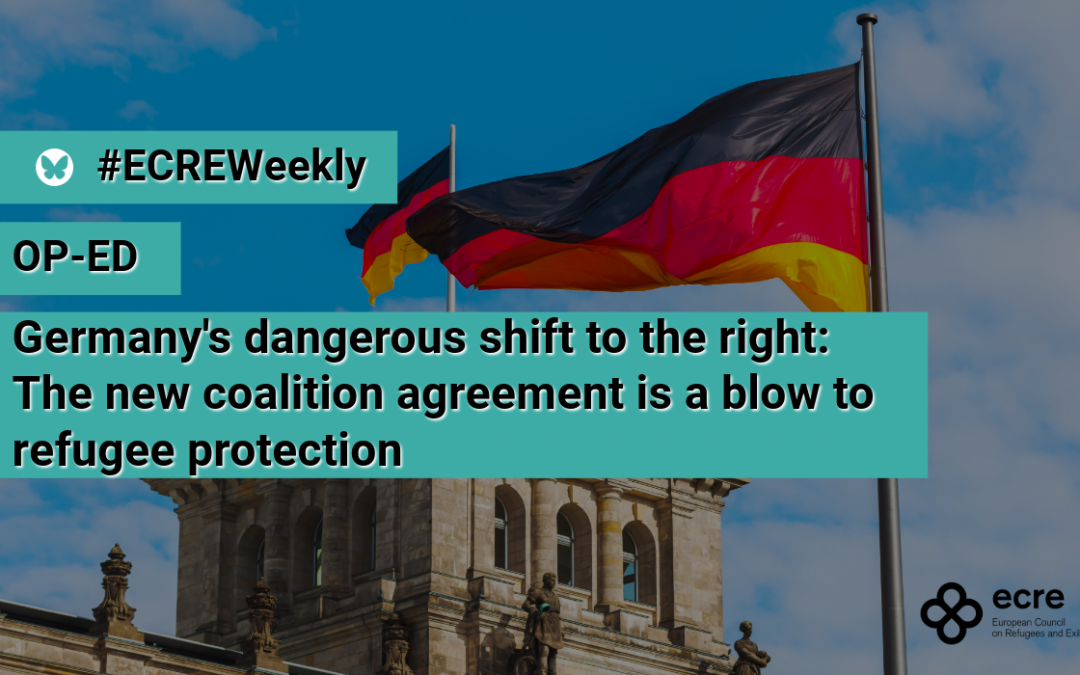By Karl Kopp and Wiebke Judith
Germany is facing a watershed moment in refugee policy. The negotiated coalition agreement between the conservative parties (CDU/CSU) and the Social Democrats (SPD) signals not only a dramatic tightening of asylum law but a dangerous departure from long-held human rights standards. Instead of reinforcing humanitarian principles and upholding the rule of law, the coalition embraces policies that undermine both.
The ink on the coalition agreement is not yet dry; all three parties still have to formally agree to it. However, it can be assumed that the coalition will not fail at this point and that the new German government will start its work after being sworn in at the beginning of May.
Turning refugees back at the border – and from rule of law
One of the main concerns is that the coalition partners have agreed to start sending back asylum seekers at German borders, despite the fact that such returns blatantly violate European and international law. The only remaining question is what the politicians mean by stating that these returns should happen “in coordination” with neighbouring countries. While Conservative politicians understand it as mainly informing the other governments, it seems that the Social Democrats want an agreement with them. While the latter appears to be unlikely when looking at public statements from Polish or Austrian politicians, the former could mean a major political dispute in Europe. Either way, these “paper pushbacks” would remain illegal. Whether or not Germany’s next Chancellor, Friedrich Merz, and his new interior minister will indeed enforce returns of asylum seekers on day one in office, as they claimed while campaigning, remains to be seen considering the political implications.
Access denied: Safe routes cut off
On another front, the current Ministry of the Interior (MoI) has already acted. While the coalition partners agreed to stop all humanitarian admissions, the MoI went beyond this to stop new arrivals under the UN Resettlement programme – although the parties have neither formally agreed on the coalition programme nor are they in office yet. Again, there is some ambiguity in the wording of the coalition agreement as it claims such programmes should be stopped “as far as possible”. This can be understood, for example, to exclude Afghans who have already received an admission confirmation for the German admission programme. It would, however, still leave many more in limbo in Pakistan and at danger of return to Afghanistan.
In a further blow to vulnerable groups, the coalition agreement includes the suspension of family reunification for those with subsidiary protection for two years. A similar suspension was in place from 2016 to 2018 in Germany under the same parties. Now, as then, it will mean further agony for families who have often already been separated for years.
The bitter irony is that while the coalition partners claim that they want to limit “irregular migration”, in fact they will more effectively close the few regular routes for some of the most vulnerable refugees.
Paving the way for more externalisation
The coalition also intends to support the removal of the so-called “connection requirement” for declaring non-EU countries as “safe third countries”, thus opening the door for externalisation deals modelled on the UK’s Rwanda agreement. This would allow the deportation of refugees to countries they have never set foot in – a fundamental break with the spirit and letter of international protection norms.
A soon expected evaluation by the European Commission on the legal framework for “safe third countries” makes this shift particularly alarming. By proposing this change, Germany is aligning itself with the European hardliners who seek nothing less than a systematic dismantling of the refugee protection system.
From fairness to burden-shifting in asylum procedures
Equally troubling is the coalition’s plan to overhaul asylum procedures by replacing the official duty to investigate (Amtsermittlungsgrundsatz) with a “burden of proof” approach (Beibringungsgrundsatz). In practice, this means placing the full responsibility for substantiating their claims on refugees themselves – many of whom flee without documentation and under extreme duress. Legal experts and human rights advocates have rightly warned that this shift threatens the fairness of asylum proceedings and may violate constitutional guarantees of due process. In addition, it does not conform to the duties to review all country of origin information that are placed on the asylum authorities by the European asylum acquis.
Ukrainian refugees will face new restrictions
The regression doesn’t stop there. Ukrainian refugees who arrive in Germany after 1 April 2025 – many of whom are women and children — will once again be subjected to the restrictive benefits system for people seeking asylum, including limited healthcare and the controversial “payment card” system. This move not only undermines integration but is also a troubling signal of growing social populism against Ukrainian refugees.
The human cost of political calculations
While policy-makers in Berlin finalised their measures to harden migration policy, the human cost became painfully visible. As the coalition agreement was being negotiated, another deadly shipwreck which claimed the lives of women and children from Afghanistan occurred near the island of Lesvos. Families in Frankfurt, Bochum, Cologne and Berlin are now grieving and identifying loved ones in the morgue.
These are not isolated tragedies – they are the foreseeable outcomes of policies that close off safe pathways and force people onto dangerous routes.
Germany at a crossroads
With this agreement, Germany risks abandoning its role as a defender of human rights and refugee protection in Europe. The country stands at a crossroads: it can either lead with humane, lawful, and pragmatic solutions or it can join the retreat into deterrence and denial. The consequences of that choice will be measured not only in policy but also in human lives.
Karl Kopp is Director and Wiebke Judith is Legal Policy Spokesperson at ECRE member organisation PRO ASYL.

